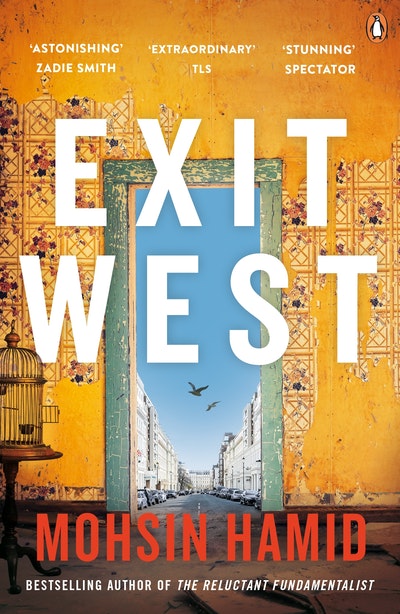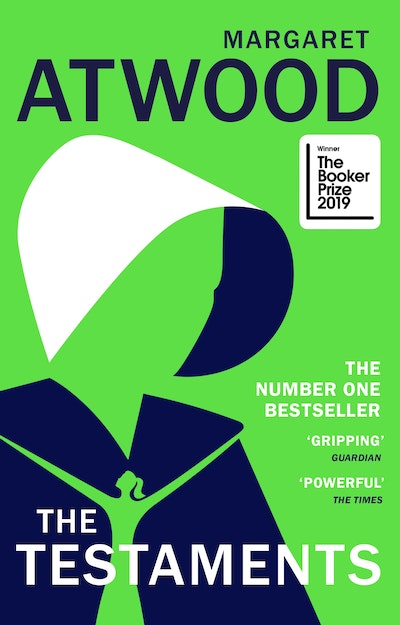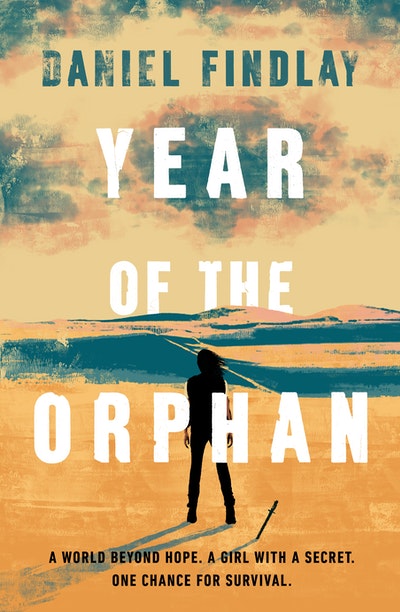- Published: 29 January 2018
- ISBN: 9780241979068
- Imprint: Penguin General UK
- Format: Paperback
- Pages: 240
- RRP: $28.00
Exit West
A BBC 2 Between the Covers Book Club Pick – Booker Prize Gems
Extract
In a city swollen by refugees but still mostly at peace, or at least not yet openly at war, a young man met a young woman in a classroom and did not speak to her. For many days. His name was Saeed and her name was Nadia and he had a beard, not a full beard, more a studiously maintained stubble, and she was always clad from the tips of her toes to the bottom of her jugular notch in a flowing black robe. Back then people continued to enjoy the luxury of wearing more or less what they wanted to wear, clothing and hair wise, within certain bounds of course, and so these choices meant something.
It might seem odd that in cities teetering at the edge of the abyss young people still go to class – in this case an evening class on corporate identity and product branding – but that is the way of things, with cities as with life, for one moment we are pottering about our errands as usual and the next we are dying, and our eternally impending ending does not put a stop to our transient beginnings and middles until the instant when it does.
Saeed noticed that Nadia had a beauty mark on her neck, a tawny oval that sometimes, rarely but not never, moved with her pulse.
Not long after noticing this, Saeed spoke to Nadia for the first time. Their city had yet to experience any major fighting, just some shootings and the odd car bombing, felt in one’s chest cavity as a subsonic vibration like those emitted by large loudspeakers at music concerts, and Saeed and Nadia had packed up their books and were leaving class.
In the stairwell he turned to her and said, ‘Listen, would you like to have a coffee,’ and after a brief pause added, to make it seem less forward, given her conservative attire, ‘in the cafeteria?’
Nadia looked him in the eye. ‘You don’t say your evening prayers?’ she asked.
Saeed conjured up his most endearing grin. ‘Not always. Sadly.’
Her expression did not change.
So he persevered, clinging to his grin with the mounting desperation of a doomed rock climber: ‘I think it’s personal. Each of us has his own way. Or . . . her own way. Nobody’s perfect. And, in any case –’
She interrupted him. ‘I don’t pray,’ she said.
She continued to gaze at him steadily.
Then she said, ‘Maybe another time.’
He watched as she walked out to the student parking area and there, instead of covering her head with a black cloth, as he expected, she donned a black motorcycle helmet that had been locked to a scuffed-up hundred-ish cc trail bike, snapped down her visor, straddled her ride, and rode off, disappearing with a controlled rumble into the gathering dusk.
The next day, at work, Saeed found himself unable to stop thinking of Nadia. Saeed’s employer was an agency that specialised in the placement of outdoor advertising. They owned billboards all around the city, rented others, and struck deals for further space with the likes of bus lines, sports stadiums and proprietors of tall buildings.
The agency occupied both floors of a converted townhouse and had over a dozen employees. Saeed was among the most junior, but his boss liked him and had tasked him with turning around a pitch to a local soap company that had to go out by email before five. Normally Saeed tried to do copious amounts of online research and customise his presentations as much as possible. ‘It’s not a story if it doesn’t have an audience,’ his boss was fond of saying, and for Saeed this meant trying to show a client that his firm truly understood their business, could really get under their skin and see things from their point of view.
But today, even though the pitch was important – every pitch was important: the economy was sluggish from mounting unrest and one of the first costs clients seemed to want to cut was outdoor advertising – Saeed couldn’t focus. A large tree, overgrown and untrimmed, reared up from the tiny back lawn of his firm’s townhouse, blocking out the sunlight in such a manner that the back lawn had been reduced mostly to dirt and a few wisps of grass, interspersed with a morning’s worth of cigarette butts, for his boss had banned people from smoking indoors, and atop this tree Saeed had spotted a hawk constructing its nest. It worked tirelessly. Sometimes it floated at eye level, almost stationary in the wind, and then, with the tiniest movement of a wing, or even of the upturned feathers at one wingtip, it veered.
Saeed thought of Nadia and watched the hawk.
When he was at last running out of time he scrambled to prepare the pitch, copying and pasting from others he had done before. Only a smattering of the images he selected had anything particularly to do with soap. He took a draft to his boss and suppressed a wince while sliding it over.
But his boss seemed preoccupied and didn’t notice. He just jotted some minor edits on the printout, handed it back to Saeed with a wistful smile, and said, ‘Send it out.’
Something about his expression made Saeed feel sorry for him. He wished he had done a better job.
As Saeed’s email was being downloaded from a server and read by his client, far away in Australia a pale-skinned woman was sleeping alone in the Sydney neighbourhood of Surry Hills. Her husband was in Perth on business. The woman wore only a long T-shirt, one of his, and a wedding ring. Her torso and left leg were covered by a sheet even paler than she was; her right leg and right hip were bare. On her right ankle, perched in the dip of her Achilles tendon, was the blue tattoo of a small mythological bird.
Her home was alarmed, but the alarm was not active. It had been installed by previous occupants, by others who had once called this place home, before the phenomenon referred to as the gentrification of this neighbourhood had run as far as it had now run. The sleeping woman used the alarm only sporadically, mostly when her husband was absent, but on this night she had forgotten. Her bedroom window, four metres above the ground, was open, just a slit.
In the drawer of her bedside table were a half-full packet of birth-control pills, last consumed three months ago, when she and her husband were still trying not to conceive, passports, cheque books, receipts, coins, keys, a pair of handcuffs and a few paper-wrapped sticks of unchewed chewing gum.
The door to her closet was open. Her room was bathed in the glow of her computer charger and wireless router, but the closet doorway was dark, darker than night, a rectangle of complete darkness – the heart of darkness. And out of this darkness, a man was emerging.
He too was dark, with dark skin and dark, woolly hair. He wriggled with great effort, his hands gripping either side of the doorway as though pulling himself up against gravity, or against the rush of a monstrous tide. His neck followed his head, tendons straining, and then his chest, his half-unbuttoned, sweaty, grey-and-brown shirt. Suddenly he paused in his exertions. He looked around the room. He looked at the sleeping woman, the shut bedroom door, the open window. He rallied himself again, fighting mightily to come in, but in desperate silence, the silence of a man struggling in an alley, on the ground, late at night, to free himself of hands clenched around his throat. But there were no hands around this man’s throat. He wished only not to be heard.
With a final push he was through, trembling and sliding to the floor like a newborn foal. He lay still, spent. Tried not to pant. He rose.
His eyes rolled terribly. Yes: terribly. Or perhaps not so terribly. Perhaps they merely glanced about him, at the woman, at the bed, at the room. Growing up in the not infrequently perilous circumstances in which he had grown up, he was aware of the fragility of his body. He knew how little it took to make a man into meat: the wrong blow, the wrong gunshot, the wrong flick of a blade, turn of a car, presence of a microorganism in a handshake, a cough. He was aware that alone a person is almost nothing.
The woman who slept, slept alone. He who stood above her, stood alone. The bedroom door was shut. The window was open. He chose the window. He was through it in an instant, dropping silkily to the street below.
When Saeed and Nadia finally had coffee together in the cafeteria, which happened the following week, after the very next session of their class, Saeed asked her about her conservative and virtually all-concealing black robe.
‘If you don’t pray,’ he said, lowering his voice, ‘why do you wear it?’
They were sitting at a table for two by a window, overlooking snarled traffic on the street below. Their phones rested screens-down between them, like the weapons of desperadoes at a parley.
She smiled. Took a sip. And spoke, the lower half of her face obscured by her cup.
‘So men don’t fuck with me,’ she said.
Exit West Mohsin Hamid
An extraordinary story of love and hope from the bestselling, Man Booker-shortlisted author of The Reluctant Fundamentalist.
Buy now











